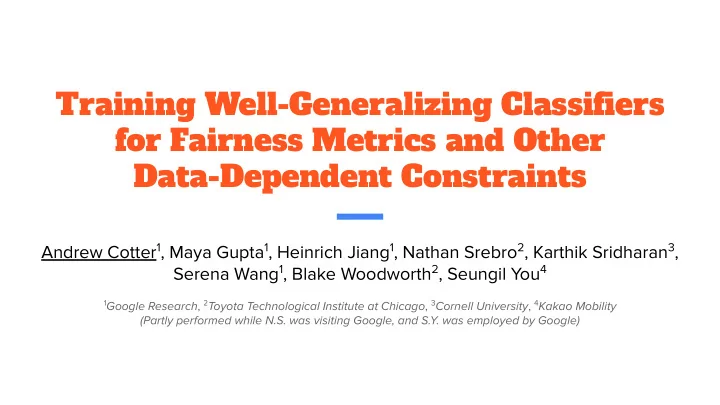

Training Well-Generalizing Classifiers for Fairness Metrics and Other Data-Dependent Constraints Andrew Cotter 1 , Maya Gupta 1 , Heinrich Jiang 1 , Nathan Srebro 2 , Karthik Sridharan 3 , Serena Wang 1 , Blake Woodworth 2 , Seungil You 4 1 Google Research , 2 Toyota Technological Institute at Chicago , 3 Cornell University , 4 Kakao Mobility (Partly performed while N.S. was visiting Google, and S.Y. was employed by Google)
Constrained Optimization ● Applications include ML fairness, churn reduction, constraining true/false positive/negative rates, and more ● We want the constraints to hold in expectation , but will typically train using a finite training set. In other words, we’re interested in constraint generalization ● We give a “trick” for improving constraint generalization (at a cost to the objective function)
Intuition: Hyperparameter Optimization Thought Experiment ● Have two i.i.d. samples, “training” and “validation” a. For several fixed 𝜇 s, train a model 𝜄 *( 𝜇 ) that minimizes the Lagrangian on the training set b. Choose a 𝜇 * such that 𝜄 *( 𝜇 *) satisfies the constraints on the validation set ● If it works, validation constraint generalization will depend on the complexity of the space of Lagrange multipliers 𝜇 , not of the model parameters 𝜄
Two-Player-Game Our “trick” for improving constraint generalization: ● Think of constrained optimization as a two-player game ● Assign different independent samples to the two players The resulting game is non-zero-sum : ● The two players have different datasets, so they optimize different functions ● In recent work [ALT’19], we considered a Lagrangian-like non-zero-sum game Here, we extend this work to prove better constraint generalization bounds ○
Results - Upper Bounds Suboptimality Bound Infeasibility Bound One dataset: Depends on model complexity (e.g. Rademacher) Two datasets: Depends on model complexity Independent of model complexity We provide several algorithms for playing this two-player game: Under certain assumptions, the in-expectation bounds satisfy the above ● ○ Instead of depending on the model complexity, the two-dataset infeasibility bound depends on the number of constraints ● We also perform experiments ○ In practice, using two independent datasets generally improves constraint generalization
{acotter,mayagupta,heinrichj,serenawang}@google.com sridharan@cs.cornell.edu Thank You! {nati,blake}@ttic.edu Poster: Pacific Ballroom #203 seungil.you@gmail.com
Recommend
More recommend